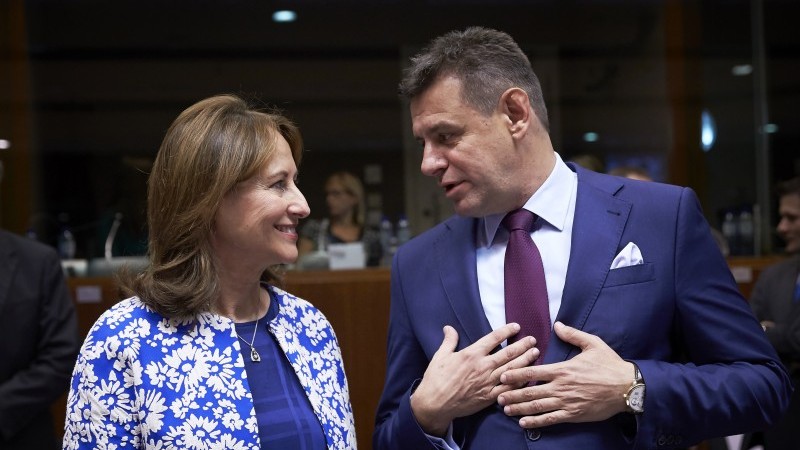The Paris climate deal is likely to become international law in early November, after the world’s third and fourth largest emitters cleared key political hurdles this week.
EU environment ministers agreed on Friday to fast-track the 28-state bloc’s ratification.
Climate commissioner Miguel Arias Canete was triumphant: “They said Europe is too complicated to agree quickly. They said we had too many hoops to jump through. They said we were all talk. Today’s decision shows what Europe is all about: unity and solidarity as member states take a European approach, just as we did in Paris.”
The key question is what he had to offer to get Poland onside. Canete reportedly went one on one with Warsaw’s environment minister Jan Szyszko shortly before the announcement.
Canete is having a bilateral with Polish minister now. #ParisAgreement
— James Crisp (@JamesCrisp6) September 30, 2016
The decision will go to the European Parliament for a vote next week, before the documents can be officially filed with the UN.
Qualified support
India, meanwhile, has given cabinet approval and plans to make the finishing touches on Sunday, Gandhi’s birthday. It all depends on richer countries living up to their side of the bargain, the government emphasised.
Narendra Modi’s administration had unsuccessfully sought membership of the Nuclear Suppliers Group in return. New Delhi-based journalist Nitin Sethi was scathing about the negotiating tactics, saying they made India look “silly”.
Anyway, the upshot is by the end of next week, barring accidents, the Paris Agreement will have passed both thresholds (55 countries representing 55% of global emissions) for entry into force. After 30 days, it becomes law, taking us to the start of the next round of climate talks in Marrakesh.
Denying denial
In the US presidential debate, Republican candidate Donald Trump denied having said that global warming was a hoax perpetrated by the Chinese. Except, er, his twitter account clearly shows he did.
Guess who’s back?
So that bid for the UN chiefdom didn’t work out, but New York’s loss is London’s gain. Christiana Figueres is returning to the climate scene and aims to mobilise climate finance for pre-2020 action, she told Ed King.
No way, Norway
In the first conference of its kind, academics and activists met in Oxford earlier this week to discuss how fossil fuel supplies fit into the climate picture.
Coal, oil and gas are not mentioned in the Paris pact, but vast quantities are unburnable if climate goals are to be met. The problem is, no producer wants to relinquish its chance to profit from the remaining carbon budget, even if it accepts the science. Who has the right to extract?
“If any country in the world needn’t produce its fossil fuel resources, it’s Norway,” according to top UCL economist Paul Ekins. Statoil’s climate adviser Arne Eik, unsurprisingly, disagrees.
Say on pay
Also under scrutiny are the bonuses paid to oil executives. BP’s Bob Dudley is in line for up to AU$1.13 million a year in exploration-linked incentives, reported activist group Market Forces.
It encourages BP to pursue controversial ventures like the Great Australian Bight, which was rebuffed by regulators for a third time this week.
UK-based Share Action is urging investors to use new powers next year to bring BP and Shell’s pay structures in line with climate goals.
Coal colonisation
China may be cutting pollution at home, but is is funding and building a huge fleet of coal power stations abroad. China Dialogue and CEE Bankwatch have mapped the data.
Quick hits
Vietnam: World Bank urges shift away from coal
South Australia: No, blackouts were not caused by renewables
Middle East: Palestine withdraws Israel-slating UN climate proposal
Arctic: Scientist struggle to keep up with rapid changes
